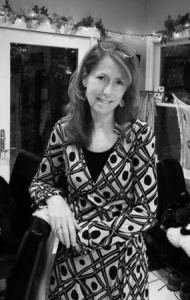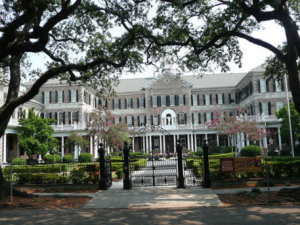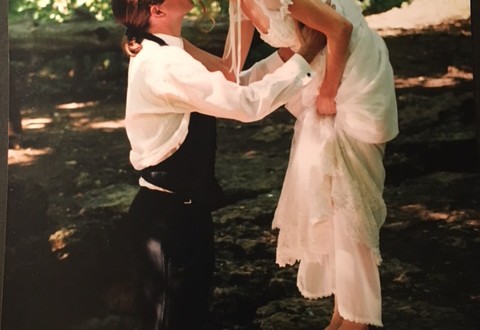At 4:30 on a Tuesday afternoon, after a long day of classes and meetings, Mrs. Beachler makes her way to the writing lab. Adorned in a quintessentially Mrs. Beachler outfit–loose brown sweater, floral scarf, and checkered pants–she smiles brightly, as though being interviewed by a newbie journalism student is actually enjoyable.
The selfless enthusiasm with which she engages in this interview is one of Mrs. Beachler’s hallmark traits, contributing to her reputation as one of the most dedicated and influential teachers at Stone Ridge. Students and faculty alike appreciate Mrs. Beachler’s skills as a teacher, ally, advocate, and quiet leader.

In October, the Stone Ridge faculty demonstrated their appreciation for Mrs. Beachler by nominating her for the Archdiocese of Washington New Teacher of the Year award, which celebrates dedicated Catholic school teachers. Despite her obvious success, Mrs. Beachler is quick to admit that her journey to Sacred Heart education was not as seamless as it may appear. Instead, her experience as an educator has presented many unexpected twists and turns, all of which contributed to Mrs. Beachler’s success as a Sacred Heart teacher.
Unlike the students at Stone Ridge, Mrs. Beachler was not fortunate enough to attend a rigorous high school with ample resources. Instead, she describes her high school as “really poorly performing.” In fact, as her school primarily tracked students to become either typists or athletes, Mrs. Beachler claims, “I never should have gone to college.” Despite these damning odds, Mrs. Beachler attended the University of Wisconsin-Madison.
Her unexpected success at enrolling in college did not, however, assure her a similar success in adjusting to the rigor of college classes. Mrs. Beachler struggled immensely with writing, receiving F’s on many of her papers. Channeling the same determination that got her into college, Mrs. Beachler frequented UM’s writing lab, learning to write through the assistance of peers and teachers. The very space in which she learned to write also became her first classroom, as she eventually volunteered at the writing lab and became a tutor for other struggling students.
After receiving her undergraduate degree in African Language and Literature, Mrs. Beachler attended graduate school for African-American studies. As one of four white students in the 250-student program, Mrs. Beachler was constantly asserting her right to be in the program. She says that she was challenged every day, as people asked her, “What are you doing here? Why are you part of this movement?” Despite the aggressive judgment of some of her peers, Mrs. Beachler thrived as a Teaching Assistant. Reflecting on this experience, Mrs. Beachler says, “I had to fight for my education in ways that many people don’t have to fight for it.”
After graduate school, in 1993 Mrs. Beachler joined Teach for America, a program that places college graduates in under-resourced public schools across the country, in a school in New Orleans, Louisiana. Although Mrs. Beachler struggled with certain aspects of the program, finding it impossible to teach full-time while also becoming certified, her experience in public school prompted her to realize how flawed the American educational system truly is.
Convinced of the need for a revolution of the public school system, yet completely overwhelmed by the vastness of the problem, Mrs. Beachler left Teach for America after three years when she was offered the position of “Director of Education” at a community center in the New Orleans projects. At the center, which provided emergency assistance and social services, Mrs. Beachler taught an Afrocentric afterschool program as well as well as a GED program for adults. “I kept seeing that the public school systems were so lacking and needed so much help,” Mrs. Beachler says of her experience at the housing center.

It was while she was working as the Director of Education, a job that proved more difficult than she had initially imagined, that Mrs. Beachler was contacted by Sister Lynne Lieux, the headmistress at the Sacred Heart School in New Orleans. Sister Lieux was looking for someone to lead a new diversity program at The Rosary, and after hearing about Mrs. Beachler’s work at the community center through one of their mutual friends, she was rightfully convinced that Mrs. Beachler was the perfect person for the job. She encouraged her to take the position, saying “There are students that need you and students that don’t, and I believe Sacred Heart students need you.”
Mrs. Beachler was initially horrified by this proposition, thinking “I don’t belong in private schools.” Looking back on her initially negative reaction, she says, “I had assumptions and beliefs about private school kids.
I’m floored by them now.” Sister Lieux didn’t back down without a fight, instead calling Mrs. Beachler every month with the same offer. After four months of this ritual, she finally convinced Mrs. Beachler to leave her job at the oldest and largest public housing community centers in New Orleans and go the Rosary. Reflecting on her decision to switch careers, Mrs. Beachler says, “[Sister Lieux] kept saying, ‘Kids in our school need people like you and need your background and need your skills […] I really got caught up in the need part.”
As Mrs. Beachler transitioned to private school teaching, motivated by the idea that private school students needed her, she faced the harsh judgements of her friends and fellow educators. While her friends ridiculed her from “selling out,” Mrs. Beachler was seeing her new students respond to her teaching in unprecedented ways. They were “showing [her] their potential and showing [her] own potential” as a teacher. She realized that she could offer things to private school students that they would otherwise lack, and thus found her purpose as a Sacred Heart educator.
These days Mrs. Beachler is still a huge advocate for public school education, serving on the Regional Alumnae Board of Directors for Teach for America. “I still believe in it, still support it, still vote for it, still use my civil action toward it. I’m just not there as a teacher,” she says. Meanwhile, she finds fulfillment “teaching African literature to predominantly white kids who might not otherwise [read] it.” As she educates her students about important racial issues such as white privilege and how to be an advocate and ally, she consistently emphasizes the value of sharing tories. “So many stories are important to be told by all sorts of people,” she says, a philosophy that has informed all facets of her work as a Sacred Heart educator.

Leave a Reply